Introduction
Established in September 1945 for the first time in the Republic of Korea, the School of Economics at Chung-Ang University has been nationally recognized for excellence in research and education. Currently with more than 700 undergraduate and 30 graduate students, the School of Economics offers a full range of courses in Economics at the B.A., M.A., and Ph.D. levels. Our alumni are, well equipped with both theory and applications, now actively working in various fields including government, industry, the financial sector, policy research, and higher education. Furthermore, with variety of research interests spanning economic theory, econometrics, macroeconomics, economic history, labor, public, monetary, development, international, and financial economics, the research of the School’s faculty members has been appeared in world-renowned academic journals such as Review of Economic Studies, International Economic Review, European Economic Review, Games and Economic Behavior, Journal of Economic Dynamics and Control, Journal of Urban Economics, Journal of Health Economics, Economica, Journal of Economic History, Journal of Futures Markets, and Korean Economic Review. Also the Journal of Economic Development, a leading journal in development economics, is housed at the School’s Economic Research Institute.

교과과정
우선 전공부문의 교과과정은 공동필수과목과 전공별 심화과목에 대한 수강으로 이루어집니다. 이중 공동필수과정은 미시 I, 거시 I 등의 경제학 석사과정을 이수하는 데 최소한의 이론적 학습을 포함한 필수교과목이 포함되며 2학기 이후부터 전공심화별 과목 수강 등으로 이루어집니다. 현재 경제학과 대학원 석사과정 학생이 많이 선택하는 전공트랙별 교과과정은 아래 표와 같습니다.
<표> 전공트랙별 교과과정 구성(예시)
| 정책분석 분야 | 금융/재무 분야 | 응용경제 분야 | |
| 공동필수과목 | 석사 과정 : 미시경제학 Ⅰ, 거시경제학 Ⅰ 박사 과정 : 미시경제학 Ⅱ, 거시경제학 Ⅱ |
||
| 공동선택과목 | 경제발전론, 경제통계분석, 한국경제론, 국제무역론, 경제이론 세미나, 국제경제학 세미나, 제도경제사 |
||
| 전공심화과목 | 재정학, 화폐금융론, 노동정책론, 경제정책연구 등 |
재무경제학, 화폐금융론, 자본시장론, 계량경제학,국제금융론, 수리 및 계량경제 세미나 등 |
노동경제학, 산업조직론, 재정학, 화폐금융론,응용계량경제학, 자원경제학 등 |
| 진출분야(예시) | 정부 및 민간 경제연구소, 기타 정책분석 관련 분야 |
금융기관 및 부설연구소, 경제연구소, 기타 금융/재무관련 분야 |
경제연구소 및 대기업, 기타 응용경제 관련분야 |
또한 경제학과 대학원에서는 학부 동일전공자(경제학부, 복수전공)에 한해 학석사 연계과정을 모집하고 있습니다. 학부 6차 학기까지 106학점 이수자를 자격 대상으로 한 학석사 연계과정은 5년의 수업으로 학사와 석사 학위를 취득하는 것이 가능하게 하는 제도입니다. 학석사 연계과정의 합격자는 7차 학기에 학부를 조기졸업할 수 있으며 대학원 입학금 면제 및 3차 학기까지 수업료 50% 감면이라는 혜택을 받을 수 있습니다.
논문작성
일반적으로 학위논문 작성은 석사학위 과정학생은 3학기가 시작되는 무렵에 지도교수를 선정하여 약 1년 동안 연구를 진행하게 됩니다. 통상적인 순서는 『논문계획서 (프로포절) 제출 → 예비심사 → 본심사』 등의 과정을 거치며, 마지막 본심사는 12월 중(3월학기 시작 기준)에 있게 됩니다. 한편 박사학위 과정학생은 박사진학과 동시에 지도교수 및 논문주제를 선정하여 학위논문을 진행하게 됩니다.
학술지 논문 발표
석사학위 논문중에서 연구성과가 우수한 것은 국내외 전문학술지에 게재될 수 있도록 경제학부 교수들의 전문적인 별도의 지도를 받을 수 있으며 경제학부 교수들과 공동연구자로서 혹은 단독연구자로서 학술지 논문게재의 기회를 가질 수 있습니다. 현재 많은 졸업생들이나 학위과정 중에 있는 학생들이 수준높은 학술지에 논문을 게재하고 있습니다. 박사학위 논문은 대부분 우수한 연구성과를 지니고 있어서 학술지에 논문이 게재될 가능성이 높습니다. 이러한 논문게재 경험은 향후 전문 연구자로서 성장하는 데 매우 중요한 경험이 됩니다. 또한 경제학과 교수들의 여러 이론적 실천적 프로젝트에 참가함으로써 구체적인 학문연구 경험들을 쌓을 수 있습니다.
학·석사학위 연계과정
소개
- 학부 과정과 석사 과정을 연계하여 총 5년(10학기)에 마칠 수 있는 과정
- 학부 6차 학기를 마친 뒤 지원 및 선발
- 합격시 7차 학기까지 학부 조기졸업
- 이후 3학기 동안 석사과정 이수 및 졸업
지원 자격
- 중앙대학교 학부생 (편입생 포함)
- 경제학 주전공, 복수전공, 연계전공, 융합전공
- 학부 6차 학기까지 총 106학점 이상 취득하고, 전공과목(전공기초포함) 평균평점 3.3 이상인 자
- 경제학부장의 추천을 받은 자
전형 일정 및 방법
- 서류 전형
- 전반기 (3월 입학)
원서 접수 : 매년 7월 중순
1차 합격자 발표 : 7차 수강신청기간 이전
최종 합격자 발표 : 다음 연도 1월 하순 - 후반기 (9월 입학)
원서 접수 : 매년 1월 중순
1차 합격자 발표 : 7차 수강신청기간 이전
최종 합격자 발표 : 당해 연도 7월 하순 - 제출 서류 : 지원서, 성적증명서, 학업계획서, 학부장 추천서, 서약서
※ 자세한 사항은 다음 첨부 파일 참고 : 학석사연계과정


